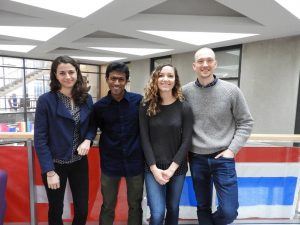Chris Andersen and Hari Iyer are fourth-year doctoral students in the Department of Epidemiology. The following article is a summary based on a conversation with them, and emails, about their experience forming the Global Cohort program.
 The Global Cohort of Doctoral Students is a community that promotes reciprocal learning between doctoral students all over the world and promotes shared capacity to address public health problems by engaging in research, forums for feedback, and professional development activities.
The Global Cohort of Doctoral Students is a community that promotes reciprocal learning between doctoral students all over the world and promotes shared capacity to address public health problems by engaging in research, forums for feedback, and professional development activities.
Epi doctoral students Chris Andersen and Hari Iyer, now in their fourth year, developed the idea for this group in the spring of their first year at the Harvard Chan School. Having had past positive experiences partnering with colleagues in various capacities in low- and middle-income countries (LMIC), they wanted to create a model of reciprocal learning adapted to the doctoral student experience at both Harvard and institutions abroad.
Once Andersen and Iyer initially connected on the idea to start the program, they did the hard work of building it from the ground up. This meant connecting with former African colleagues to run the idea by them and getting the support and advice of various faculty and leadership from around the school. “The more people that we talked to, the more we realized that the needs were fairly diverse, that there was a broad diversity that people were coming from and a broad set of needs, interests, and potential benefits that we can draw from each other,” said Andersen. He continued, “We wanted to develop a program that was flexible to the needs and interests of students based at Harvard and at LMIC institutions.”
The foundation of this program is the 1-on-1 partnership which is structured through a “learning contract.” Student pairs composed of one Harvard student and one LMIC institution student write a learning contract that outline their goals, how they can support the other in achieving those goals, and research activities in which they will engage. Andersen and Iyer piloted this idea with doctoral colleagues in Rwanda and Botswana in 2017. They went on to expand their activities to include a Canvas-based web forum where the students post their work and receive feedback from the entire community. “Being interested in the intersection of statistics and global health, engaging with the Global Cohort has added an important layer to my experience as a PhD student that I wouldn’t get from solely crunching numbers for my dissertation,” says Sara Sauer, a 3rd year biostatistics PhD student who joined the Global Cohort later in 2017.
Indeed, a critical component of the program’s development has been engaging with a broad body of students. The team doubled in size in 2017 with the addition of Sauer and Simone Passarelli (3rd year nutrition PhD student), who partnered with peers in Rwanda and Ethiopia. In 2018, nine additional doctoral students at the Harvard Chan School signed on to join the program. Passarelli commented, “It’s exciting to see how much interest there has been among the PhD community at Chan. It says to me that we’re filling a much-needed gap in global learning.”
This March, through funding from the Rose Service Learning Fellowship, the team will host their first annual symposium, which will bring all doctoral student partners from abroad to Boston for a week of team trainings and to host an event to share their experiences with the Harvard community.
When asked about how their Harvard Chan School experience prepared them for this endeavor, Iyer said “We’ve just been so lucky that most of the people we’ve reached out to over email about this project have sat down and met with us. I don’t think you could say that about a lot of places – virtually every single person when we’ve sat down with them and shared about what we’re going to do, gave us a least a half an hour of their time, gave us really good feedback…” In particular, Wafaie Fawzi, Professor of Nutrition, Epidemiology and Global Health & Population, and Bethany Hedt-Gauthier, Associate Professor in the Department of Biostatistics, have been key mentors from the early stages of the project. Their combined decades of experience doing capacity building work informed Andersen and Iyer’s approach to a reciprocal capacity building model for doctoral students by emphasizing engagement with a broad stakeholder base and setting achievable short-term goals to demonstrate proof-of-concept.
When asked about what advice they would give to other students who are interested in starting a similarly ambitious endeavor, Andersen said “Breaking new ground entails risk, so the first thing is to abandon fear of failure. If you fail, you’ll still have learned some life lessons. If you succeed, you’ll have made a contribution to your community. Second, focus on effective communication. The first part of this is good listening; try to truly understand the perspectives of your stakeholders and be responsive to their feedback. The second part is effectively communicating your ideas; concisely conveying your key messages (especially with the use of visuals) can work wonders in helping people understand what you’re trying to do.”
The Global Cohort team is always looking for new student and faculty partners. If interested, please email them at gcds@hsph.harvard.edu.
If you missed the seminar on “Reciprocal Capacity Building” on Wednesday, March 27, 2019, you can watch the recording here and slides.
Photo: Alyssa Pellegrini



